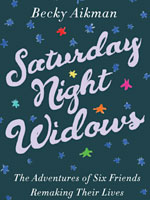
Becky Aikman's book has received lots of praise and press.
Q: You did do a lot of hard-science reporting for the book ? enough to feel confident dismissing what you call "the five bogus stages of grief."
A: The "five stages of grief" were never intended to be about grief, but about dying. More recent studies show that grief comes in waves: intense at first, then you alternate between feeling normal and feeling sad, and gradually over time the waves become less pronounced. I visited the Loss, Trauma and Emotion Lab at Columbia University, and discovered that the true grieving process looks nothing like the long-term, debilitating sadness many people seem to expect. That's why I based the Saturday Night Widows on the idea that getting out into the world with friends who have a sense of humor is helpful. Getting back to normality is helpful. New experiences help, too.
Q: If we have no community in which to grieve, are we grieving alone?
A: Americans are spending more and more time with immediate family, which makes it harder on us when we lose a member of that family. We don't have the broad ties we had in the past. Everyone in my social circle was married, for example, and suddenly I was the odd person out. I wasn't socially active while my husband was sick. [After he died] I felt I had to get out there and forge an entirely new community of people I could have companionship with. It was hard work.
Q: Your strategy was that "together we might find a way to triumph over loss."
A: From the moment I was on my own again, I craved role models for how to live a solo life, so having this group of women [to learn from] was fantastic: We could talk about how we were [each] approaching things, and I could draw from [the] others' approaches to dating again or finding a new place to live.
Source: http://www.aarp.org/entertainment/books/info-02-2013/saturday-night-widows-triumph-after-loss.html
dystonia tourettes gonzaga rosie o donnell soda bread recipe vanderbilt evan mathis
No comments:
Post a Comment
Note: Only a member of this blog may post a comment.